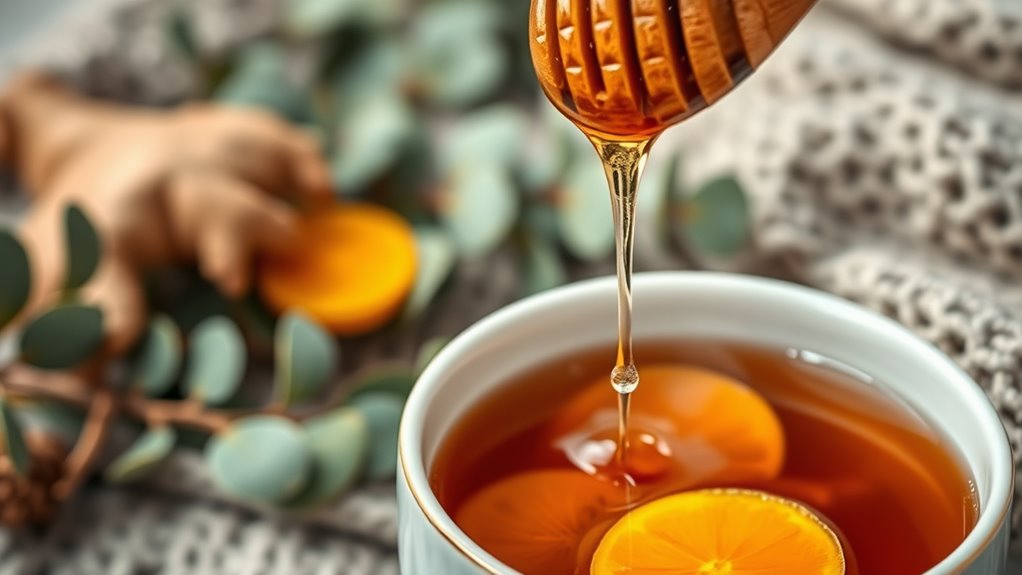Dry Cough Remedies I Swear By for Quick Relief
A dry cough can feel like a persistent thorn in your side, nagging and uncomfortable. Fortunately, there are effective natural remedies that can provide quick relief. From soothing honey and warm water mixtures to the calming effects of herbal teas, these methods can ease your discomfort. Curious about how simple techniques like steam inhalation and saltwater gargles can help? Let’s explore these remedies that have stood the test of time.
Key Takeaways
- Mix 1-2 tablespoons of honey with warm water to soothe throat irritation and ease coughing effectively.
- Sip herbal teas like chamomile or ginger for their anti-inflammatory properties that promote comfort and relaxation.
- Inhale steam from hot water, optionally adding eucalyptus or peppermint, to relieve irritation and loosen mucus.
- Gargle with saltwater to reduce throat inflammation, clear mucus, and inhibit bacterial growth, providing quick relief.
- Use a humidifier to add moisture to the air, soothing dry airways and reducing coughing, especially in dry environments.
Honey and Warm Water Mixture
Honey has natural antimicrobial properties and can help coat your throat, reducing irritation. Combine one to two tablespoons of honey with a cup of warm water, stirring well. This blend not only helps ease coughing but also promotes hydration. Studies suggest honey is effective for adults, often outperforming over-the-counter cough syrups. Incorporating this simple mixture into your routine can provide quick relief from your dry cough and enhance your overall comfort during recovery. Additionally, honey mixed with warm water can be particularly beneficial for dry cough relief, as it helps soothe irritation in the throat.
Herbal Teas for Soothing Relief
After trying the honey and warm water mixture, you might want to explore herbal teas for additional soothing relief from a dry cough.
Herbal teas not only taste great but also offer various health benefits.
Here are three teas you should consider:
-
Chamomile Tea: Known for its anti-inflammatory properties, chamomile can help reduce throat irritation.
-
Ginger Tea: This warming spice has natural anti-inflammatory qualities that can ease coughing.
-
Peppermint Tea: The menthol in peppermint acts as a natural decongestant, calming the throat and reducing cough reflex.
Additionally, anti-inflammatory properties of chamomile tea can enhance comfort and promote relaxation.
Sip these brews for quick comfort and relief!
Steam Inhalation Techniques
Steam inhalation can be a highly effective technique for alleviating dry cough symptoms.
To do this, boil water and pour it into a bowl. Lean over the bowl, covering your head with a towel to trap the steam. Take deep breaths for 10-15 minutes.
You can enhance the experience by adding essential oils like eucalyptus or peppermint, which may help open airways and provide added relief. Make sure to maintain a safe distance to avoid burns.
Doing this a few times a day can soothe irritation and loosen mucus, providing you with quick relief from that nagging dry cough.
Saltwater Gargle Benefits
One simple yet effective remedy for soothing a dry cough is a saltwater gargle.
This age-old practice offers several benefits that can help you find relief:
- Reduces Inflammation: The salt helps draw out excess fluid from inflamed tissues in your throat, easing discomfort.
- Cleanses the Throat: Gargling can remove mucus and irritants, making it easier to breathe and speak.
- Antimicrobial Properties: Saltwater can inhibit the growth of bacteria, potentially preventing infections from worsening. Additionally, gargling reduces swelling and can provide quick relief with regular practice.
Humidifier Use for Dry Environments
A humidifier can be a game-changer for those dealing with a dry cough, especially in arid environments. By adding moisture to the air, it helps soothe irritated airways and reduces coughing. When selecting a humidifier, consider the size of the room, maintenance needs, and type of humidifier. Additionally, using a humidifier can be beneficial in reducing sinus pressure for those also experiencing nasal congestion.
| Type | Pros | Cons |
|---|---|---|
| Cool Mist | Easy to maintain | Can promote mold growth |
| Warm Mist | Kills germs | Uses more electricity |
| Ultrasonic | Quiet operation | Requires frequent cleaning |
| Evaporative | Self-regulating humidity | Needs a filter replacement |
| Impeller | Good for large spaces | Can be bulky |
Investing in a humidifier can provide significant relief.




